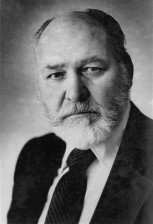Canadian who sheltered Americans in Iran dies

This Jan. 27, 1981 photo shows John Sheardown in Ottawa, Ontario. Sheardown, a former Canadian diplomat who hid fugitive American Embassy staffers during the 1979 Iran hostage crisis, has died. He was 88. AP
TORONTO — John Sheardown, the former First Secretary at the Canadian Embassy in Tehran who sheltered fugitive American Embassy staffers at his home during the Iran hostage crisis in 1979 and who had a lengthy career in Canada’s foreign service, has died at age 88.
His wife Zena said Sheardown passed away in an Ottawa hospital on Dec. 30 and had been treated for Alzheimer’s disease for the past four years but also suffered from other ailments.
Sheardown, a diplomat in Tehran during the Islamic Revolution, played a key role in the events depicted in Ben Affleck’s Oscar-contender film “Argo,” although he was not portrayed in the film.
Almost a week after militant Iranian radicals seized the U.S. Embassy in Tehran on November 4, 1979, taking 52 Americans hostage for 444 days in retaliation for U.S. support for the recently deposed shah, the Canadian diplomat received a call from one of the six Americans who had managed to evade capture. American consular officer Robert Anders was calling his friend Sheardown for help.
“‘What took you so long?'” was Sheardown’s reply, said his wife.
Article continues after this advertisementAfter that phone call, the Sheardowns agreed without hesitation to shelter four of the six Americans in secrecy in their 20-room house in Tehran. Canadian ambassador, Ken Taylor, housed the other two Americans.
Article continues after this advertisement“It would have been selfish for us not to do so,” Zena Sheardown told The Associated Press from her home in Ottawa, Ontario. “There weren’t many places to hide in Iran, we had the room, they needed our help and it was just not in John’s nature to refuse help to anyone.”
For 79 days, the pair lived a low-profile life in tumultuous Tehran, facilitating a household that was comfortable and welcoming for the Americans, while helicopters streamed overhead, everyone’s nerves calmed only by boisterous dinners together and heartfelt hospitality.
“We have a lot of fond memories. We spent American Thanksgiving together, New Year’s Eve, together. Every night we would all sit around for dinner together. There was a lot of humor and laughter. It was a nice time to have to spend together,” she said. “We tried to be protective, but we also went out of our way to make them feel as if they weren’t imposing on us.”
She said her husband became the father figure of the household, whom everyone would turn to for advice when they went through moments of fear.
“He kind of became our leader and since he was a pipe smoker and had more of a mature nature, he became known as ‘Big Daddy,’ everyone would wait for Big Daddy to come home,” she said chuckling.
While Sheardown might be best known for his role in what became known as the “Canadian Caper,” he was noticeably absent from “Argo,” which told the story of how the CIA used a fake Hollywood film crew to rescue the six U.S. Embassy staffers sheltered by the Canadians. Affleck has apologized for leaving Sheardown out of the film, which he said was the result of time constraints and plot developments.
“It was frustrating,” said Zena Sheardown. “It would have been nice if the story was told correctly because basically, if the Canadians weren’t there to help, who knows what would have happened to those Americans.”
In a story posted in October on the Slate magazine website, one of the rescued American diplomats, Mark Lijek, said Sheardown’s role was “indispensable.”
“Without his enthusiastic welcome we might have tried to survive on our own a few more days. We would have failed,” said Lijek.
Sheardown was made a Member of the Order of Canada for his role in the rescue. His wife later also received the award for her role.
Born in Sandwich, Ontario, later absorbed by Windsor, on Oct. 11, 1924, John Vernon Sheardown joined the Royal Canadian Air Force at age 18. He flew scores of Lancaster bomber missions in World War II. On one mission, he barely managed to get his flak-riddled plane back to Britain. With the Lancaster losing power, he told his crew to bail out. He tried to wrestle the aircraft under control before opting to leap at the last minute. His chute barely had time to open and he broke both legs upon impact.
“I often thought he had nine lives with the way he lived his life,” his wife said.
He stayed in the Canadian Armed Forces after the war, serving in Korea, before joining Canada’s immigration service around 1962. He was posted in London, Glasgow, New Delhi and Los Angeles, during his extensive 27-year diplomatic career.
“He was a proud, dignified man, proud to serve his country, a dedicated foreign services officer and well-respected by all,” his wife said.
It was that dignified air that caught the eye of his future wife when she first spotted him in the Canadian High Commission in London, England.
“He looked like an English gentleman, he was smoking a pipe, very dapper,” she said.
She asked a friend who that was and her friend replied: “That’s John Sheardown, the kindest man I’ve ever known. If he was down to his last penny and he thought you needed it, he would give it to you.”
The two were married in Los Angeles in 1975. It was his second marriage.
“It was a long love story,” she said, her voice cracking with emotion. “He lived a wonderful life and we shared many wonderful years together.”
Besides his wife, the former Zena Khan, he is survived by his sons, Robin and John; his sisters, Jean Fitzsimmons and Betty Ann Whitehead; six grandchildren; and 10 great-grandchildren.